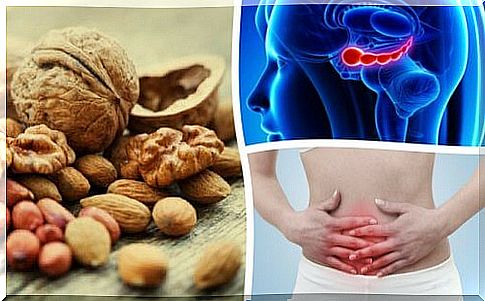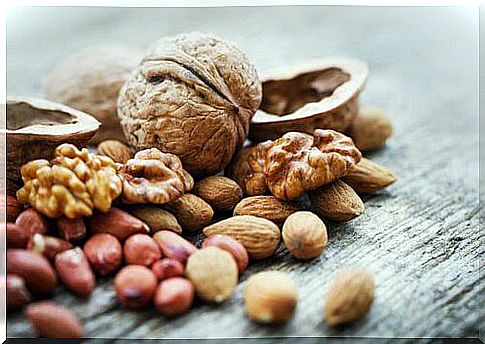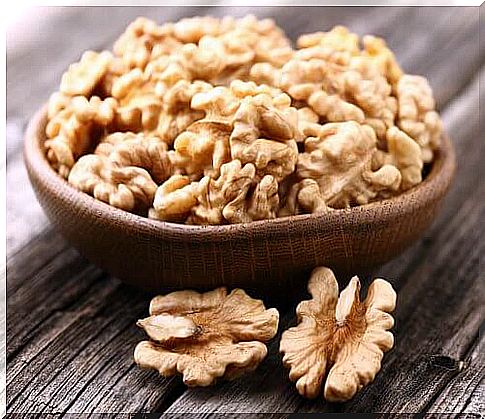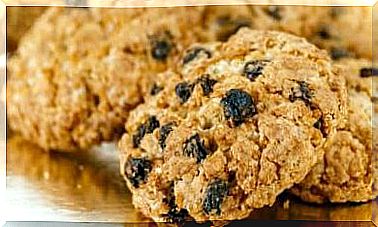Benefits Of Daily Nuts
Nuts should be part of your daily diet to benefit from their many benefits

Nuts, but also other kernels such as almonds, sunflower seeds, flax seeds, sesame seeds, pumpkin seeds and more are a source of positive properties for your health – and health care.
By the end of this article, you will be convinced that you should be eating more nuts in the future !
Which nuts are recommended?
In general, it does not matter what kind of seeds or nuts you use, it depends on the variety and, as everywhere, monotony should be avoided.
To benefit from the many positive properties, 25g per day is enough! That doesn’t sound like much at first, but if you look at the calorie and fat content of nuts, you will quickly understand why.
It’s like everywhere: the crowd makes the poison! The following kernels and nuts are easy to integrate in everyday life:
- Walnuts
- Hazelnuts
- peanuts
- Almonds
- Sunflower seeds
- Pumpkin seeds
- linseed
- sesame

Ideas for consumption
Of course, you’re not a squirrel that feeds on nuts. As already mentioned, the daily amount should also not exceed 25g.
Take a look at the typical pack of peanuts that you might want to crunch in front of the TV: that’s four times this amount and is a guarantee for love handles and obesity, which is anything but beneficial for your health!
To increase your nut consumption, but still keep it to the recommended levels, we have the following advice and ideas for you:
- Out eighth in the future a nut granola to use to buy and combine this with fresh fruit instead of “fruit muesli” with dried fruit.
- Try bread with sunflower seeds, flax seeds, or pumpkin seeds. There is also nut bread with walnuts or hazelnut kernels.
- Prepare yourself a pesto with almonds or pine nuts .
- Add cashew nuts instead of meat to vegetable dishes, this is also a high-quality source of protein.
- Another way to consume nuts: nut butter ! You not only get it as peanut butter (please, sugar-free), but also as a 4-nut mix, hazelnut butter , almond butter , tahini (made from sesame), sunflower seed butter and more! Nut butter tastes delicious on bread, as a base for sauces, in vegetable dishes or in smoothies.
- If you don’t like nuts, try to incorporate them into your diet as oil : walnut oil is wonderful in winter salads, pumpkin seed oil goes perfectly with lamb’s lettuce, sesame oil is suitable for Asian cuisine, hazelnut oil, especially roasted hazelnut oil or almond oil is delicious in desserts or desserts.
- If you want nuts in front of the TV: crack them yourself ! This takes longer and protects against overeating. The maximum daily amount is only 25g!
- If you want sweet pastries: prefer nut biscuits or nut cakes.
Don’t overdo it, however, so as not to let the benefits end in weight gain! Weigh out 25g of nuts to get a feel for how much that is!

Why are nuts so healthy?
What all nuts, seeds and kernels have in common is their high content of essential fatty acids. A deficiency in essential fatty acids leads to various deficiency symptoms such as skin changes (excessive cornification), susceptibility to infection, growth disorders, hair loss and a lack of blood platelets.
Well-known essential fatty acids are “Omega3” and “Omega6”, which should literally be “on everyone’s lips” due to advertising:
- The “healthy omega3” is contained in all vegetable oils and improves the flow properties of the blood.
- It also lowers blood pressure and lipids, which is why it can prevent hardening of the arteries.
There is a lot of omega3 in fish (the cooler the water, the fatter the fish, the richer in omega3) and in local oils such as rapeseed oil, soybean oil, walnut oil and also in the flaxseed on your “healthy- looking bun” or in muesli.
There are monounsaturated, diunsaturated and polyunsaturated fatty acids. What they all have in common is that they are liquid at room temperature.
Monounsaturated fatty acids are found in olive oil, rapeseed oil and many nuts and seeds, for example.
The body is able to produce these monounsaturated fatty acids itself; therefore they are not essential.
The diunsaturated fatty acids include linoleic acid, for example, which is contained in safflower or sunflower oil.
Polyunsaturated fatty acids can be found in fish, corn oil, but also in safflower oil and nuts. The body cannot produce polyunsaturated fatty acids itself, so they are essential. So get to the nuts!

Nuts are good for your brain
The typical “trail mix” contains nuts. But why?
Because there is plenty of choline in nuts. The B vitamin is the preliminary stage for the important neurotransmitter acetylcholine (keyword: soy!) – a guarantee for full concentration.
In addition to omega-3 fatty acids, many nuts also contain the amino acid isoleucine, which also increases the ability to think.
In view of this, please only use unroasted and unsalted nuts. If nuts are heated by roasting, they no longer contain all of the active ingredients.









